
Discover the top marketing automation tools for small businesses to streamline your marketing efforts and drive growth like never before.
The majority of businesses today utilize marketing automation tools. Research indicates that approximately 56% of companies are using this technology, and this number is steadily rising.
In today’s digital world, small businesses face many challenges. Competing with larger companies requires them to be efficient, accurate, and creative. One effective way to achieve this is by using marketing automation tools. These tools help streamline and improve various marketing tasks. They save time, reduce mistakes, and boost customer engagement, leading to business growth.
Table of contents
What is Marketing Automation Tools?
Marketing automation tools helps businesses automate repetitive marketing tasks like email campaigns, social media posts, and ad management. These tools make it easier to carry out complex marketing strategies with less manual work. By using data and analytics, it ensures personalized and timely customer interactions, which increases engagement and conversions.
Marketing automation brings together all parts of a marketing strategy into one system. It includes tools for managing customer relationships (CRM), segmenting audiences, and analyzing data. By centralizing these functions, businesses get a complete view of their marketing efforts and can make better decisions based on data. This results in more targeted and effective campaigns, higher customer satisfaction, and better return on investment (ROI).
Let’s go through this in 5 steps for you to understand it better:
- Marketing automation tools streamline repetitive tasks like email campaigns and social media management.
- They personalize customer interactions using data, boosting engagement and conversions.
- By centralizing CRM, audience segmentation, and data analysis; these tools offer a comprehensive view of marketing efforts.
- These tools enables informed decision-making for targeted campaigns and improved ROI.
- Leveraging these tools is essential to ensure business growth in the competitive environment of small businesses.
Why Small Businesses Need Marketing Automation?
Small businesses often have limited resources, making it hard to manage big marketing campaigns. Marketing automation helps by making things more efficient and effective. It saves time by automating routine tasks, allowing small business owners to focus on growing their business. It also improves the accuracy of marketing efforts through data-driven insights, ensuring every campaign is targeted and impactful.
For small businesses, automating tasks like email follow-ups, social media posts, and customer segmentation is a game-changer. This not only saves time but also ensures consistent and precise marketing activities. Additionally, marketing automation tools come with built-in analytics that provide deep insights into customer behavior and campaign performance. This information is crucial for improving marketing strategies and making informed decisions.
Marketing automation helps small businesses stay competitive. In a digital world where customers expect personalized and timely communication, automation enables small businesses to meet these expectations without overwhelming their resources. By automating key marketing tasks, small businesses can compete effectively with larger companies.
Let’s explore once again the reasons why small businesses need marketing automation:
- Sends personalized messages at the right time, making customers happier and more loyal.
- Keep customers coming back for more.
- Let’s small businesses grow their marketing without spending a lot more money.
- Provides a way to grow without high costs.
- Helps small businesses compete well, even against bigger companies.
- Helps small businesses achieve their goals more easily and effectively.
10 Top Marketing Automation Tools of 2024
Email Marketing Automation Tools
1) Brevo
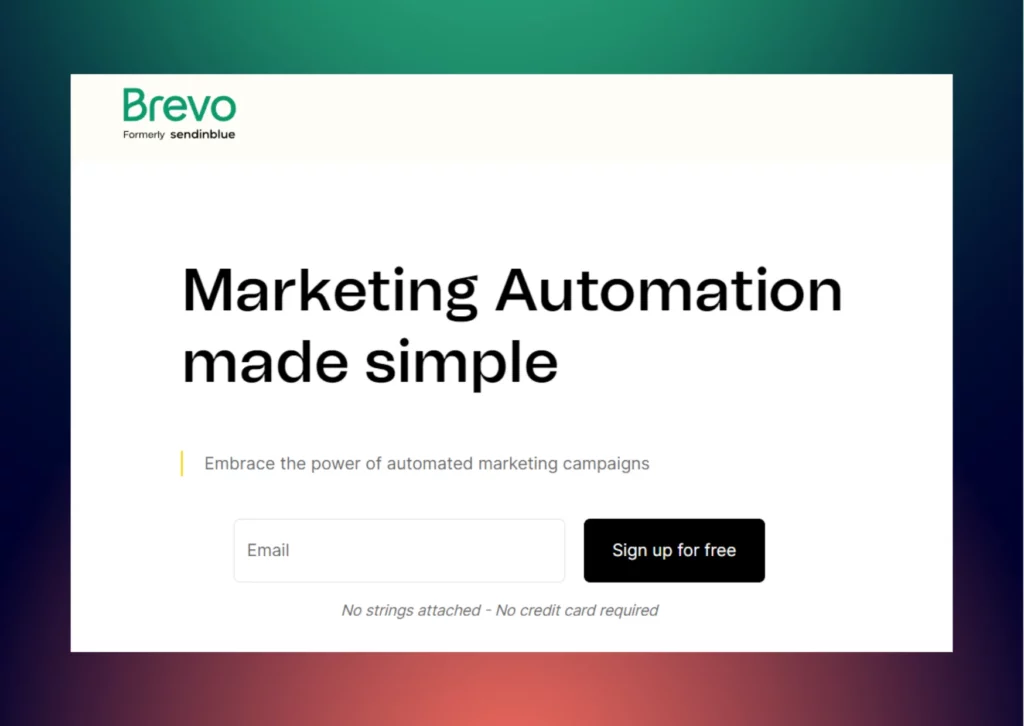
Brevo is a great marketing tool made for small businesses. It’s focuses on email marketing for small business, offering tools designed specifically to help small companies. With Brevo, you can make special plans that send out emails by themselves. You can choose when emails get sent based on what people do on your website.
Pros:
- Gain access to up-to-the-minute insights into the performance of your email campaigns, allowing you to track metrics such as open rates, click-through rates, and conversion rates in real-time.
- Utilize Brevo’s intuitive workflow editor to create and customize automated workflows tailored to your specific marketing objectives. With this feature, you can easily design complex sequences of actions and triggers to optimize your marketing efforts.
- Take advantage of Brevo’s drag-and-drop builder to create visually appealing and engaging email campaigns with ease. This user-friendly interface allows you to design professional-looking emails without the need for coding or design skills.
- Streamline communication and collaboration within your team using Brevo’s shared inbox feature. With a centralized inbox, your team can easily manage and respond to customer inquiries, ensuring efficient and organized communication across all channels.
2) Constant Contact
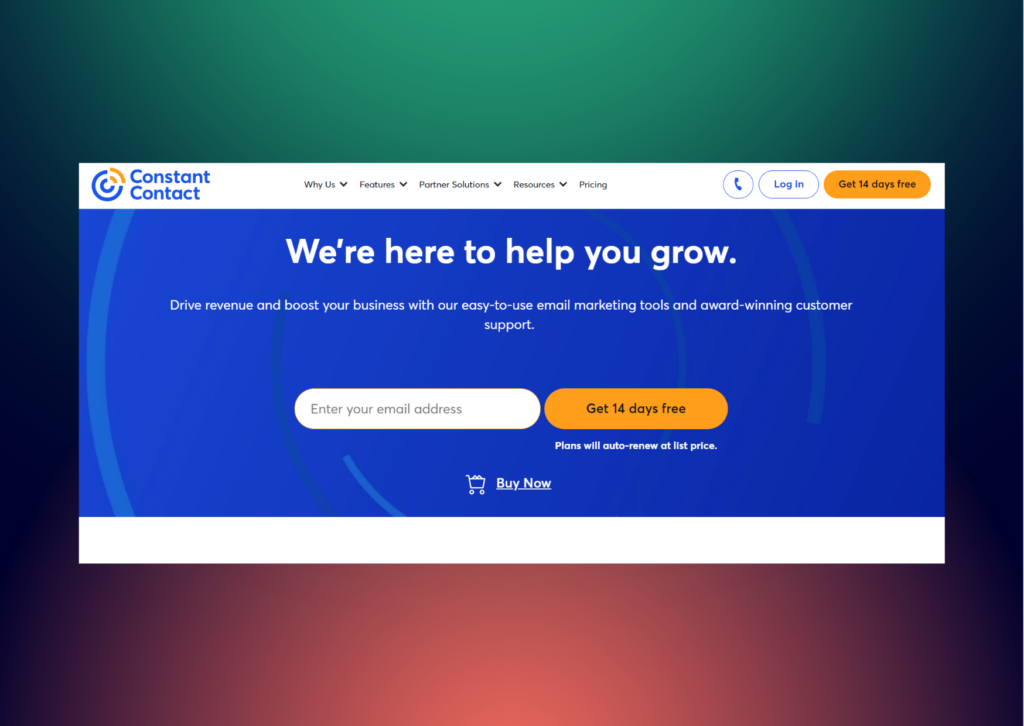
Constant Contact lets you create and schedule email sequences that are sent automatically to your contacts. You can set up triggers so emails are sent based on what actions your contacts take.
- Constant Contact lets you tailor emails to each recipient, making them more engaging.
- You can automate emails, like resending to those who didn’t open them, ensuring better reach.
- Constant Contact provides thorough reports on how your emails perform, helping you make informed decisions.
- With hundreds of templates, you can create professional-looking emails quickly.
- You can see how recipients interact with your emails, like clicks and views.
- Constant Contact offers help via live chat and phone, making it easy to get assistance when needed.
3) Mailchimp
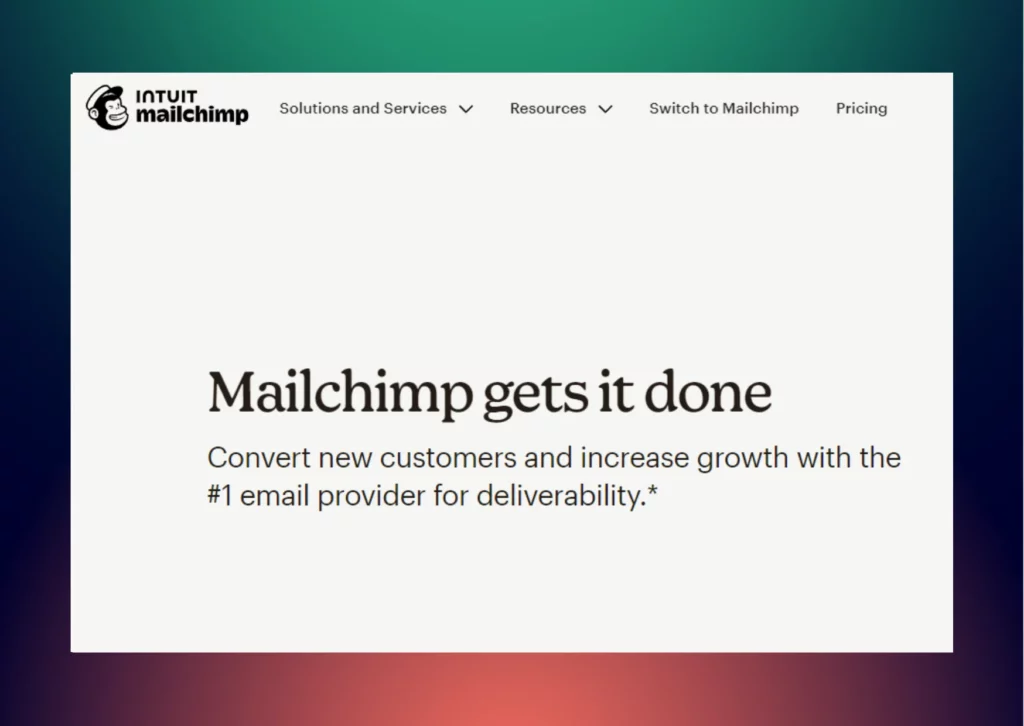
Mailchimp‘s automation helps you send personalized emails when certain things happen, like an event or a date. It has simple tools for making, scheduling, and sorting your emails. This way, you can keep your contacts updated and interested automatically, even when you’re not online.
Pros:
- Easily engage with your audience and receive recommendations with Mailchimp’s pre-built journey options.
- Seamlessly integrate data from various apps and web services to enhance your marketing efforts and gain deeper insights into your audience.
- Enjoy round-the-clock support via email and chat, ensuring that assistance is always available (24/7 Support) whenever you need it.
- Utilize Mailchimp’s campaign management tools to plan, execute, and track your marketing campaigns with ease, ensuring optimal results and ROI.
Ad Automation Tools
4) Adsby
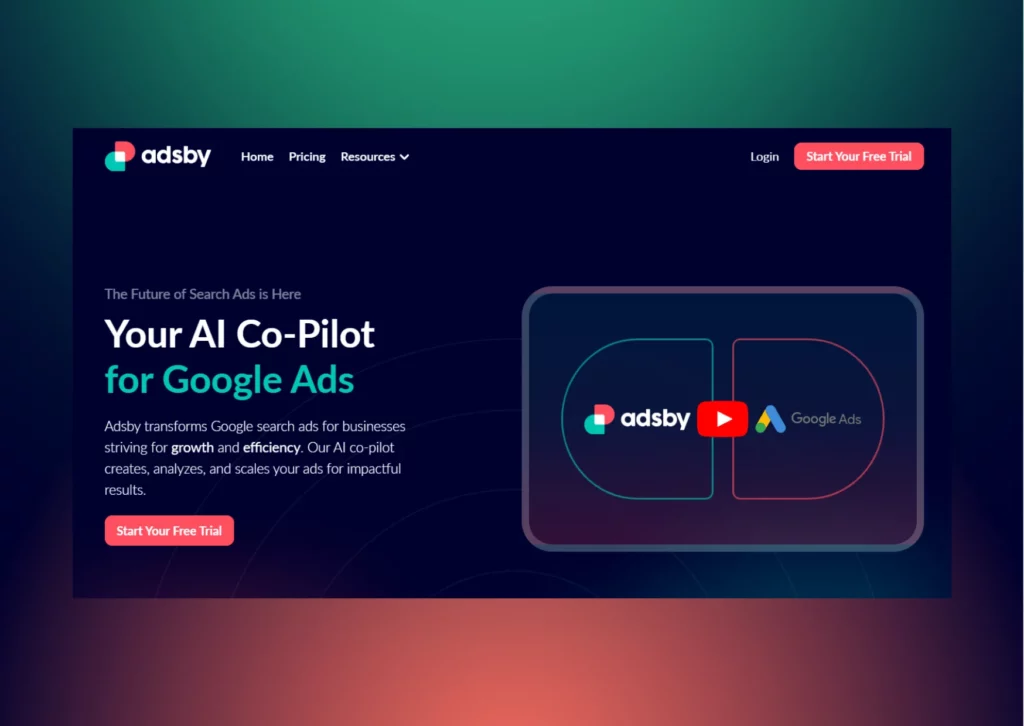
Adsby helps businesses with Google ads to grow better. Our AI co-pilot to make, check, and grow your ads for better results. It makes online marketing easier for beginners and professionals. Adsby guides you step by step to set up your ads well.
Pros:
- Adsby helps you set your advertising goals to match what you want to achieve in your business.
- Make your ads come to life, without any hassle. Easily create great ads fast with Adsby’s Free AI Ad Generator.
- Adsby’s Free Keyword Generator suggests important keywords for your ads, so they connect with your market audience.
- Use Adsby’s Free AI Ad Text Generator to quickly make ad texts for Google, Facebook, Instagram, LinkedIn, and Twitter.
- Use Adsby to find out who your best customers are and how to reach them best.
- Keep an eye on your spending with real-time updates. You’re in control of how much you spend and how well your ads work.
- Get fast answers and tips from our AI helper whenever you need them.
Sales Automation (CRM)
5) HubSpot

HubSpot provides a complete suite of tools to meet all your marketing requirements.
One of the standout features of HubSpot is its ability to streamline content organization and provide a clear overview of your sales pipeline. Through an intuitive dashboard, users can easily manage and track their content assets, ensuring smooth collaboration and efficient workflow management.
Overall, HubSpot’s Service Hub empowers businesses to optimize their marketing efforts, improve collaboration, and achieve their sales goals with ease.
Pros:
- Efficiently manage customer inquiries and support requests with a robust ticketing system that organizes and tracks customer issues.
- Engage with website visitors in real-time through live chat, providing immediate assistance and improving customer satisfaction.
- Consolidate all communication channels, including email, chat, and social media, into one unified inbox for streamlined customer interactions.
- Store, track, and manage data from marketing events such as webinars, conferences, and trade shows, providing valuable insights for future marketing initiatives.
6) Pipedrive
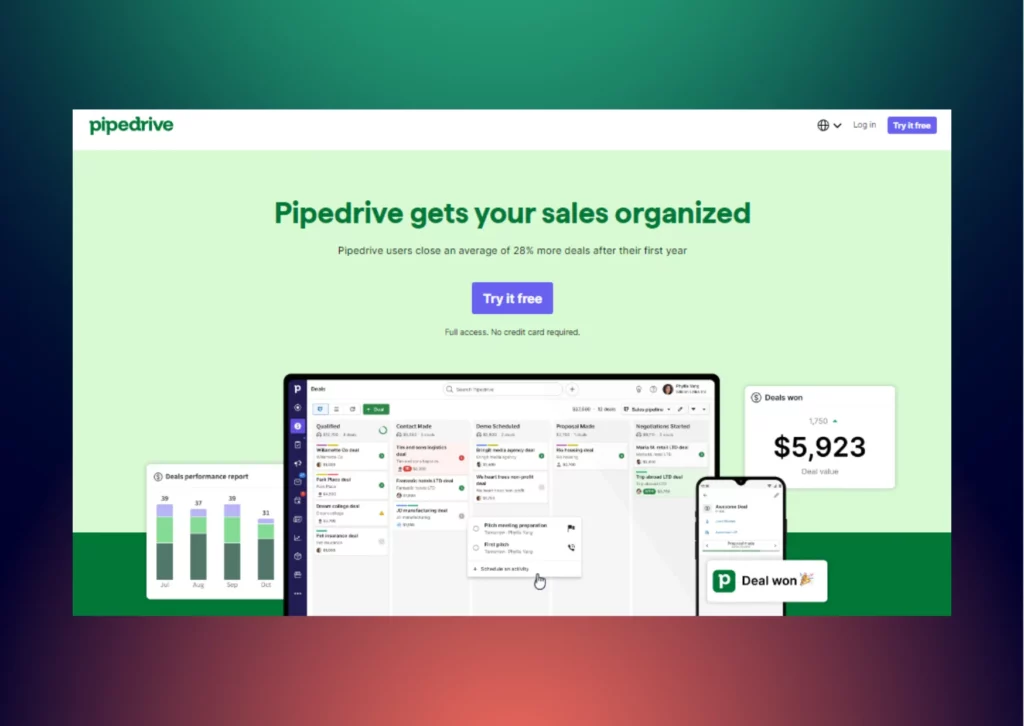
Pipedrive offers advanced security alerts and rules to ensure the protection of CRM data.
It’s a CRM solution tailored to assist in lead prioritization, communication tracking, automation of repetitive tasks, and other essential functions.
Pros:
- Pipedrive provides advanced security features, including alerts and rules, to protect CRM data from unauthorized access.
- Seamlessly make and receive calls from web to mobile devices within Pipedrive, enhancing communication efficiency.
- Organize and track deals visually through various sales stages, facilitating efficient deal management.
- Provide instant support and assistance to leads and clients through chatbot and live chat features.
Social Media Marketing Automation
7) Buffer
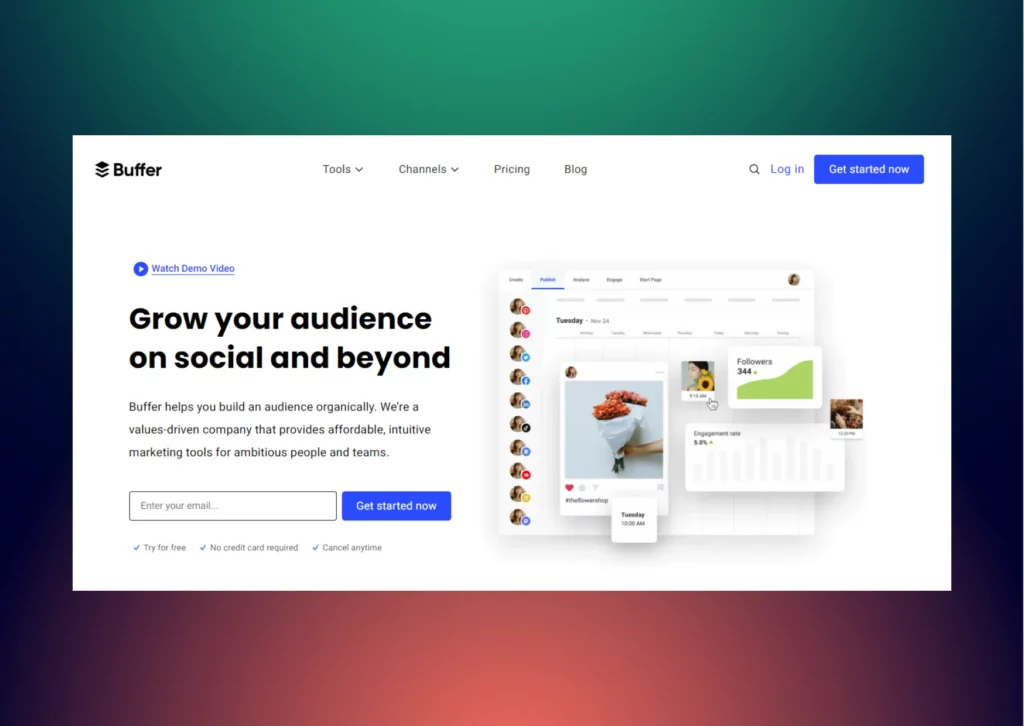
Buffer is a social media scheduling tool crafted to plan and automate content posting across various platforms like Instagram, Facebook, LinkedIn, Twitter, and Pinterest.
It allows users to schedule posts ahead of time and automatically publish them during peak engagement hours for optimal reach and interaction.
Pros:
- Buffer facilitates simultaneous management of marketing campaigns across various social media channels, ensuring consistent messaging.
- Organize and track relevant hashtags efficiently within Buffer, optimizing post visibility and engagement.
- Enhance brand visibility and engagement by customizing video thumbnails for social media posts in Buffer.
- Automatically shorten URLs for cleaner post appearance and track link clicks for performance analysis.
8) Manychat

Manychat enables automated messaging on Instagram Direct and Facebook Messenger, allowing customers to make purchases directly through these platforms.
With Manychat’s user-friendly drag-and-drop visual editor, building a bot and automating interactive conversations is simple and intuitive.
Pros:
- Manychat integrates with over 2,000 business tools, streamlining workflows and boosting productivity.
- Easily segment contacts using customer tags, enabling targeted and personalized communication.
- Build custom chatbot flows tailored to your business needs with an intuitive drag-and-drop interface.
- Combine Manychat with SMS and email to maintain seamless communication across channels.
Content Marketing Automation Tools
9) SureTriggers
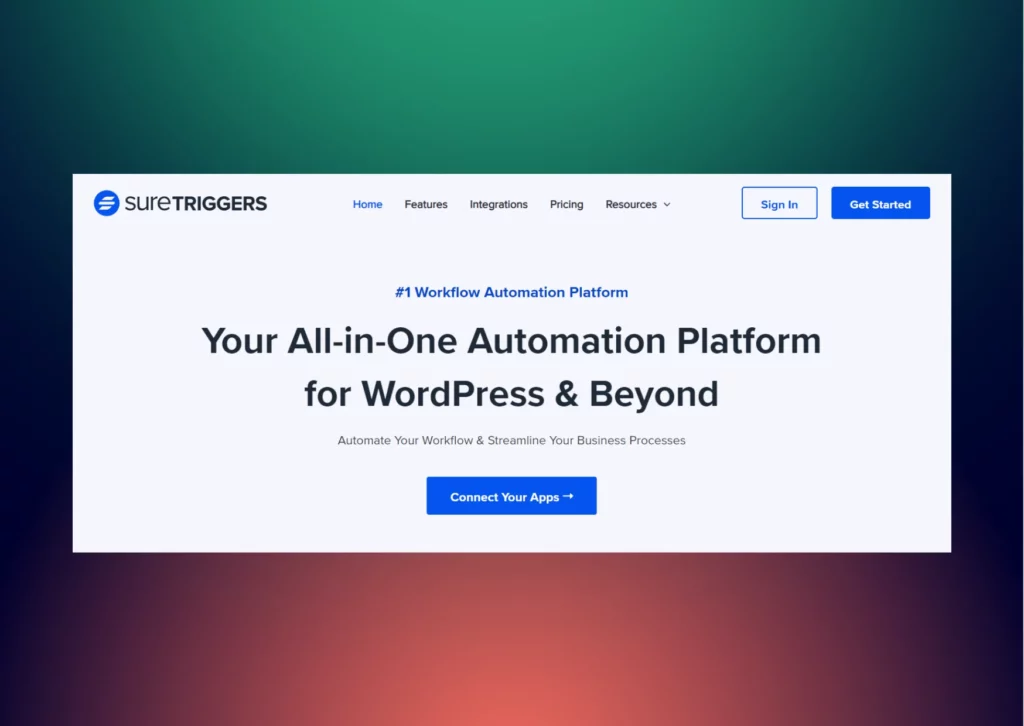
SureTriggers is a fantastic tool for content marketing. It simplifies and boosts your content efforts. You can link different apps to create custom workflows easily.
With SureTriggers, you can schedule, create, and share content effortlessly. It automates posting on various platforms, schedules social media updates, and sends emails to engage your audience.
It’s perfect for content marketers, ensuring your strategies are efficient, consistent, and reach a wider audience.
Pros:
- SureTriggers connects effortlessly with hundreds of apps and services, giving users flexibility and compatibility for smoother workflows.
- With SureTriggers, tasks are automated, saving users time and effort. This means less manual work and more focus on important tasks.
- Users can tailor automation processes to fit their needs with SureTriggers’ customizable workflows. Whether it’s content publishing or customer support, users have control over how things are automated.
- SureTriggers integrates smoothly with content management systems and analytics tools, making it easy to use existing tools and data for automation.
10) Zapier
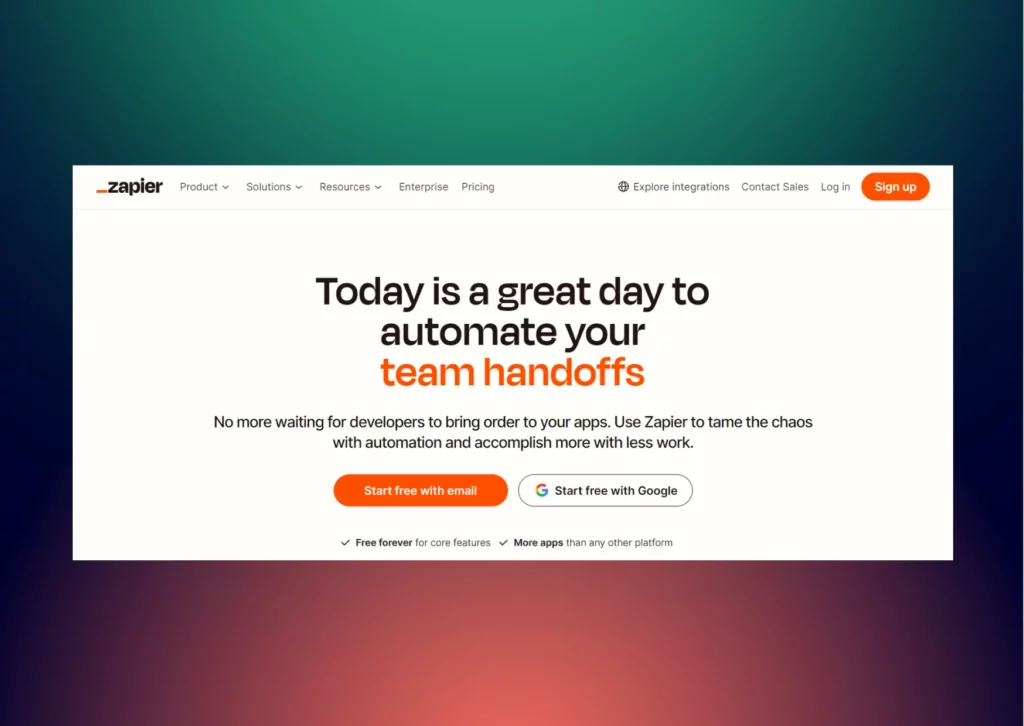
Zapier is known for its massive collection of supported apps, allowing users to automate tasks across various platforms. It simplifies connecting different apps, making it easy to automate tasks like transferring data or triggering actions based on events.
One of Zapier’s main perks is its ability to move content between different platforms effortlessly. Whether you’re syncing data between tools or automating social media posts, Zapier makes it simple to create connections and automate tasks.
In essence, Zapier is a handy tool for streamlining workflows and saving time by automating tasks across different apps and platforms.
Pros:
- Zapier works with thousands of apps and services, giving you plenty of options for automating your tasks.
- By automating repetitive tasks, Zapier frees up your time for more important things.
- You can customize Zapier to fit your needs, making it simple to create automation flows that work for you.
- Zapier offers pricing that’s budget-friendly, so automation is accessible to everyone.
Using AI in Marketing Automation Tools
An AI marketing automation tool is a type of software that uses artificial intelligence and machine learning to assist with various marketing tasks. These tools are particularly useful for repetitive marketing jobs because AI can make predictions based on the data it receives, allowing for more efficient and effective task management.
One of the most impressive aspects of AI marketing automation tools is their automation capabilities. Automation can significantly reduce the workload for marketers by handling routine tasks such as sending out emails, scheduling social media posts, and managing customer interactions. This allows marketers to focus on more strategic and creative aspects of their work, leading to better overall results.
In 2024, AI developments in marketing automation tools have seen significant advancements, enhancing their capabilities and effectiveness. Here are some significant developments
- Enhanced Personalization
- Predictive Analytics
- Natural Language Processing (NLP)
- Cross-Channel Integration
- Sentiment Analysis
Benefits of Using AI in Marketing Automation Tools
- Personalized Communication: AI helps small business make messages more personal to each customer, making them feel special.
- Easy Data Understanding: AI makes it easier to understand lots of data quickly, helping marketers make smarter decisions.
- Better Targeting: AI helps find the right people to advertise to, so ads are more likely to reach interested customers.
- Improved Campaigns: AI constantly makes ads better by learning from how people respond to them, helping them get more attention.
- Less Work: AI does repetitive tasks like sending emails or sorting leads, saving time for marketers to do other important things.
- Smart Lead Management: AI helps figure out which customers are most likely to buy, so sales teams can focus on them first.
- Flexible Customer Experience: AI changes how customers interact based on what they do, making sure they see the right stuff at the right time.
- Saving Money: By using AI, companies can spend less on ads that don’t work well, making marketing cheaper and more effective.
What Makes a Marketing Automation Tool the Best?
The best marketing automation tools for small businesses are easy to use, affordable, and packed with useful features. They should work well with other systems, grow with the business, and offer good support and training. It’s also important that they give helpful insights and data, and let businesses customize things to fit their needs.
Small businesses need tools that are easy to understand and set up because they might not have experts on staff. They also need tools that won’t break the bank. These tools should fit smoothly with other software the business uses, like customer databases and online stores. And they should be able to handle more work as the business grows.
Having good support and learning resources is important too. These tools should come with guides and help if businesses run into problems.
Getting useful data and reports is key for making smart marketing choices. The best tools should show how well campaigns are doing and what customers are doing. And they should let businesses change things to work better for them.
Conclusion
Small businesses need marketing automation tools to make their marketing easier and help them grow steadily. With these tools, they can automate tasks, personalize how they talk to customers, and see how well their marketing is working. Choosing the right tools can completely change how a small business does its marketing, making it more efficient and successful.
Using marketing automation lets small businesses do their marketing tasks faster and better. It also helps them connect with customers in a more personal way. As technology keeps changing, using automation in marketing will become even more important for any small business.